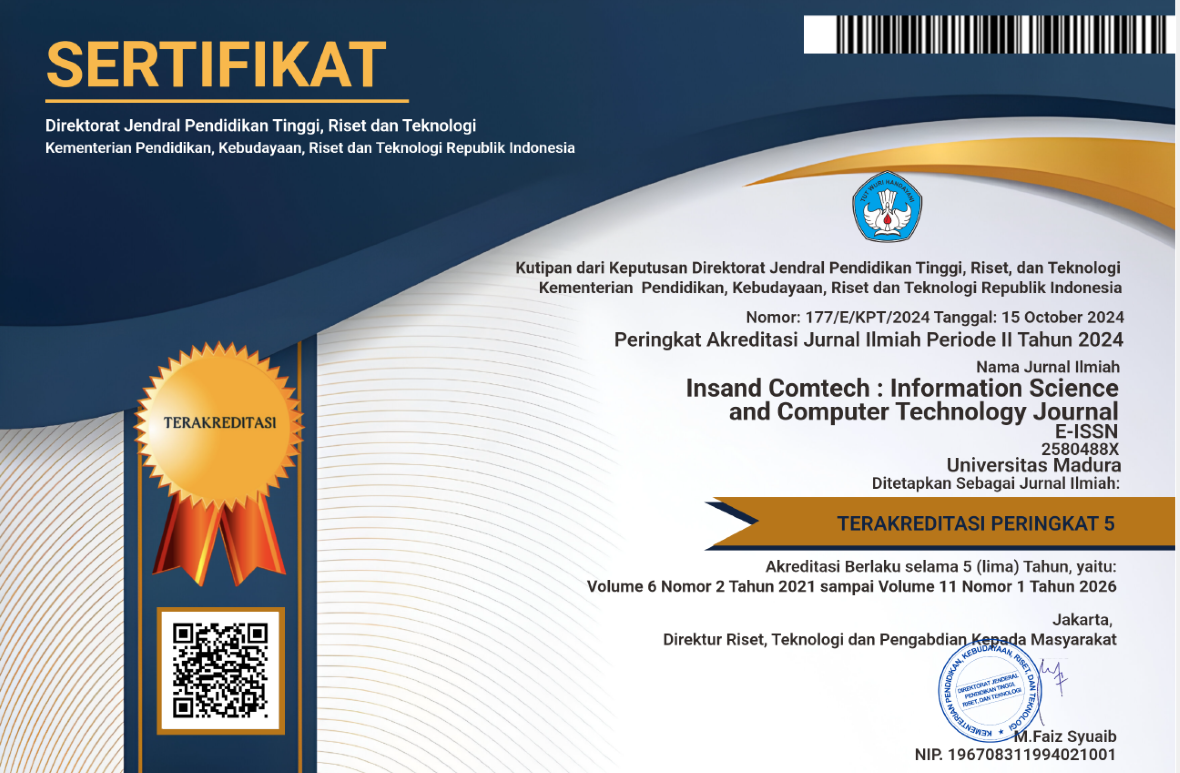PENGGALIAN KEBUTUHAN MENGGUNAKAN METODE PERSONA PADA SISTEM PENILAIAN LMS
Abstract
The development of a software is very necessary to understand the users/users of the system. The aspect of user convenience in using the system is a very important aspect so that the system that has been created is in accordance with the purpose of its manufacture and according to user needs. Persona is a technique of Human Computer Interaction by collecting information from users as a reference in understanding the needs of users. The purpose of this study is to apply the persona technique by adjusting the validation process to the user personas of our system users. The method used in this research is the Human Computer Interaction technique. User persona is used as a reference so that a system is made based on user needs so that the purpose of making the system can be met. The result of this research is to use the user persona technique in the elicitation of needs which will facilitate understanding related to the development of a system.
Keywords: Human Computer Interaction, Persona, Elicitation of Needs
Full Text:
PDFReferences
S. Winarni and Syahrial, “Inovasi Kurikulum dan Pembelajaran Pada Masa Pandemi Civid-19,” J. Ilm. Wahana Pendidik. https//jurnal.unibrah.ac.id/index.php/JIWP, vol. 6, no. 3, pp. 317–322, 2020, doi: 10.5281/zenodo.3960178.
P. Pendidikan, J. Jauh, and U. T. Indonesia, “Praktek pendidikan jarak jauh di universitas terbuka indonesia,” vol. 19, no. 2, pp. 200–213, 2020.
S. Sudaryanto, W. Widayati, and R. Amalia, “Konsep Merdeka Belajar-Kampus Merdeka dan Aplikasinya dalam Pendidikan Bahasa (dan Sastra) Indonesia,” Kode J. Bhs., vol. 9, no. 2, pp.
–93, 2020, doi: 10.24114/kjb.v9i2.18379.
W. Hartanto, “Penggunaan E-Learning sebagai Media Pembelajaran,” J. Pendidik. Ekon., vol. 10, no. 1, pp. 1–18, 2016.
A. Kusnayat, N. Sumarni, A. S. Mansyur, Q. Y. Zaqiah, and U. T. Bandung, “Pengaruh Teknologi Pembelajaran Kuliah Online Di Era Covid-19 Dan Dampaknya Terhadap Mental Mahasiswa,” EduTeach J. Edukasi dan Teknol. Pembelajaran, vol. 1, no. 2, pp. 153–165, 2020.
M. I. Mustofa, M. Chodzirin, L. Sayekti, and R. Fauzan, “Formulasi Model Perkuliahan Daring Sebagai Upaya Menekan Disparitas Kualitas Perguruan Tinggi,” Walisongo J. Inf. Technol., vol. 1, no. 2, p. 151, 2019, doi:
21580/wjit.2019.1.2.4067.
N. H. Zhafira, E. Yenny, and Chairiyaton, “Daring Sebagai Sarana Pembelajaran Selama Masa Karantina Covid-19,” J. Bisnis dan Kaji. Strateg. Manaj., vol. 4, no. 1, pp. 37–45, 2020.
F. Firman and S. Rahayu, “Pembelajaran Online di Tengah Pandemi Covid-19,” Indones. J. Educ. Sci., vol. 2, no. 2, pp. 81–89, 2020, doi:
31605/ijes.v2i2.659.
A. kusnayat Watnaya, M. hifzul Muiz, Nani Sumarni, A. salim Mansyur, and Q. yulianti Zaqiah, “Pengaruh Teknologi Pembelajaran Kuliah Online Di Era Covid-19 Dan Dampaknya Terhadap Mental Mahasiswa,” EduTeach J. Edukasi dan Teknol. Pembelajaran, vol. 1, no. 2, pp. 153–165, 2020, doi:
37859/eduteach.v1i2.1987.
M. Wijayanengtias and D. Claretta, “Student Perceptions of Online Learning During the Covid-19 Pandemic Persepsi Mahasiswa Surabaya Tentang Kuliah Online Saat Pendahuluan Metode Penelitian Hasil dan Pembahasan,” KanalJurnal Ilmu Komunikaasi, vol. 9, no. 1, pp. 16–21, 2020.
H. N. Z.R and W. Saugi, “Pengaruh Kuliah Online Terhadap Minat Belajar Mahasiswa Pendidikan Agama Islam (PAI) di IAIN Samarinda,” el-Buhuth Borneo J. Islam. Stud., vol. 2, no. 2, pp. 121–131, 2020, doi: 10.21093/el-buhuth.v2i2.2330.
N. Adijaya, “Persepsi Mahasiswa dalam Pembelajaran Online* *Pengembangan teori dari penelitian berjudul ‘persepsi mahasiswa terhadap materi ajar pada pembelajaran online’ yang
telah dipublikasi di Jurnal Eduscience Vol. 3/1,” Wanastra J. Bhs. dan Sastra, vol. 10, no. 2, pp.
–110, 2018, doi:10.31294/w.v10i2.3931.
S. N. Dewi, “Dampak Covid 19 Terhadap Pembelajaran Daring Di Perguruan Tinggi | Jurnal Pendidikan Ilmu Pengetahuan Sosial (JPIPS),” vol. 2020, no. 12, pp. 87–93, 2020, [Online]. Available: https://e-journal.upr.ac.id/index.php/JP-IPS/article/view/1919.
A. H. Elyas, “Penggunaan model pembelajaran e-learning dalam meningkatkan kualitas pembelajaran,” J. War., vol. 56, no. 04, pp. 1–11, 2018, [Online]. Available: http://jurnal.dharmawangsa.ac.id/index.php/juwarta/article/view/4.
Desak Made Rai Ningsih, “Pengaruh Metode Kuliah Online Terhadap Tingkat Pemahaman Materi Kuliah Hukum Investasi Pada Mahasiswa Universitas Teknologi Indonesia,” J. Pendidik., vol. 21, no. 2, pp. 104–110, 2020, doi:
33830/jp.v21i2.840.2020.
A. Widiyono, “Efektifitas Perkuliahan Daring (Online) pada Mahasiswa PGSD di Saat Pandemi Covid 19,” J. Pendidik., vol. 8, no. 2, pp. 169–177, 2020, doi: 10.36232/pendidikan.v8i2.458.
R. D. Yuniarti, “Meningkatkan Kualitas Pembelajaran Di Prodi Tata Niaga Jurusan Pendidikan Ekonomi Fpeb-Upi,” Manajerial, vol. 8, no. 16, pp. 66–77, 2010
F. B. Saputro, M. Somantri, and A. Nugroho, “Pengembangan Sistem Kuliah Online Universitas Diponegoro Untuk Antar Muka Mahasiswa Pada Perangkat Bergerak Berbasis Android,” Transmisi, vol. 19, no. 1, pp. 15–21, 2017, doi: 10.12777/transmisi.19.1.15-21.
S. Yodha, Z. Abidin, and E. Adi, “Persepsi Mahasiswa Terhadap Pelaksanaan E-Learning Dalam Mata Kuliah Manajemen Sistem Informasi Mahasiswa Jurusan Teknologi Pendidikan Universitas Negeri Malang,” J. Kaji. Teknol. Pendidik., vol. 2, no. 3, pp. 181–187, 2019, doi:
17977/um038v2i32019p181.
E. Rusdiana and A. Nugroho, “Respon pada Pembelajaran Daring bagi Mahasiswa Mata Kuliah Pengantar Hukum Indonesia,” Integralistik, vol. 19, no. 2, pp. 148–152, 2017, [Online]. Available: https://journal.unnes.ac.id/nju/index.php/integralistik/article/view/21834/.
DOI: http://dx.doi.org/10.53712/jic.v6i2.1302
Refbacks
- There are currently no refbacks.
Jurnal Ilmiah Terapan: 2580-488X
Jurnal Ilmiah Terapan: 2302-6227
Diindeks oleh:
Diterbitkan oleh Prodi Informatika - Teknik Informatika - Universitas Madura
Jl. Raya Panglegur Km 3,5 Pamekasan
Telepon: (0324) 322231
website: http://ejournal.unira.ac.id/index.php/insand_comtech/index
Surel : insandcomtech@unira.ac.id

InsandComtech oleh Universitas Madura dilisensikan di bawah Lisensi Creative Commons Atribusi 4.0 Internasional .








